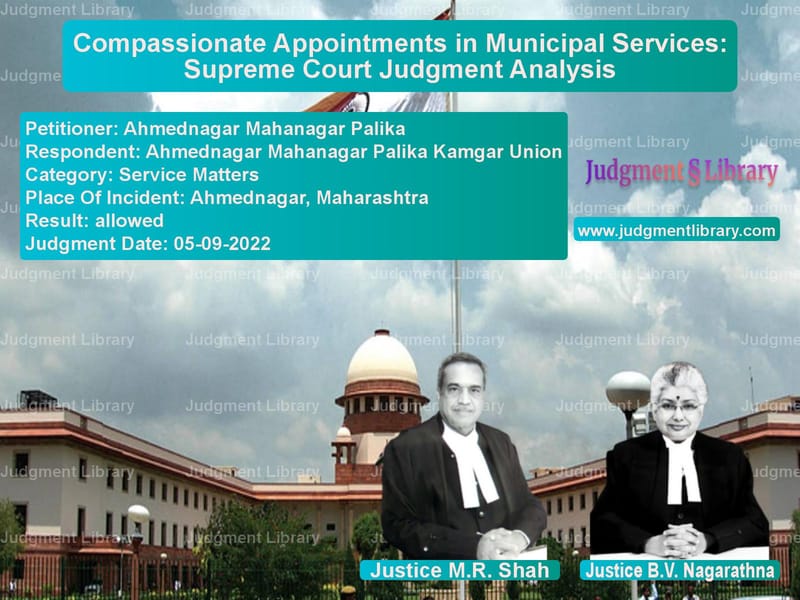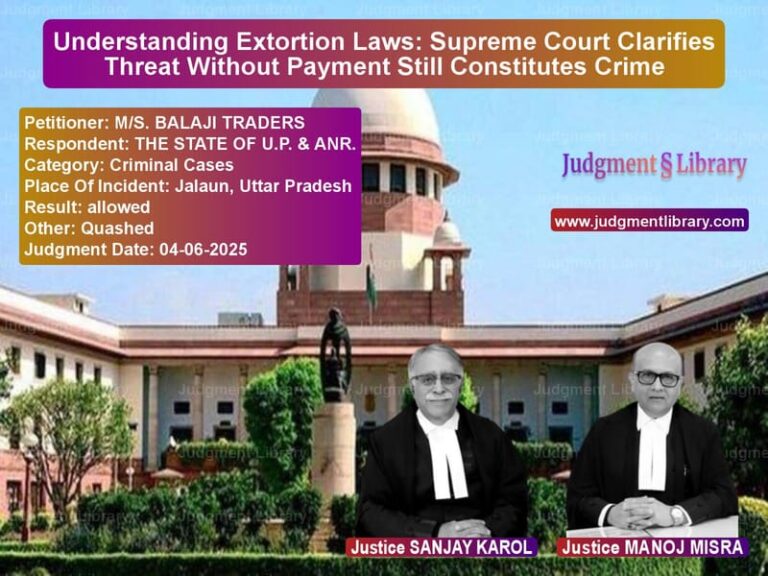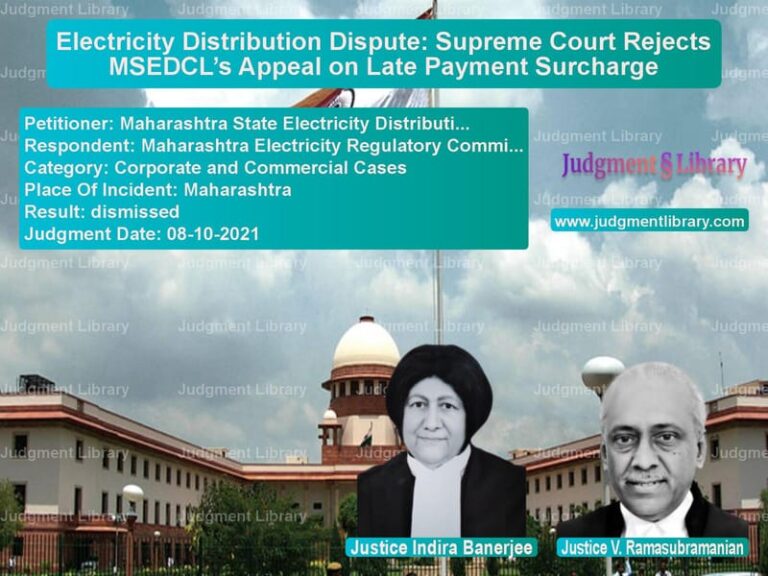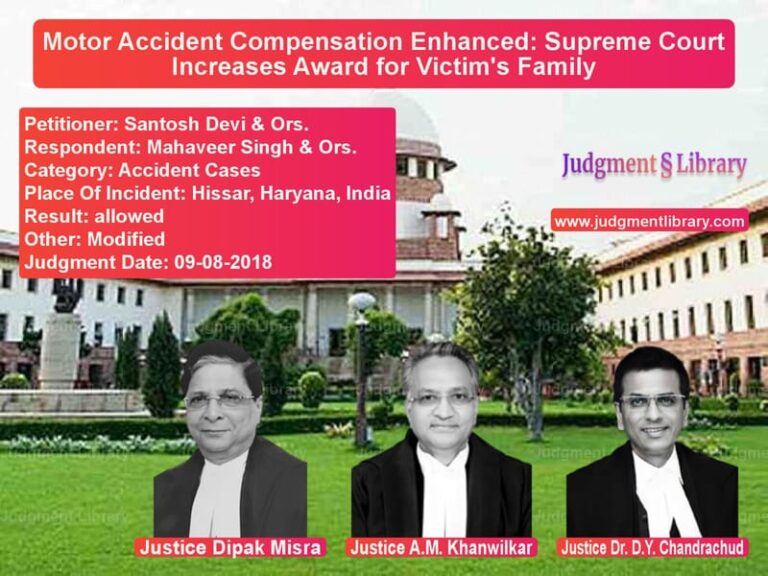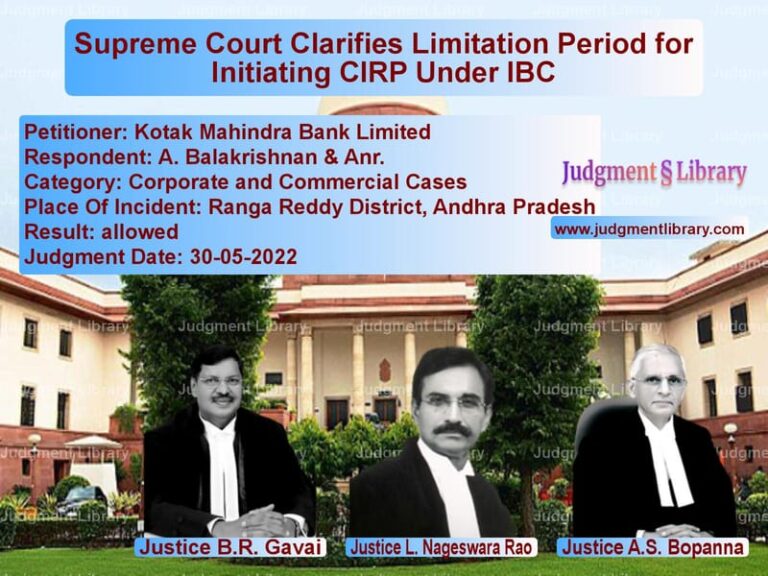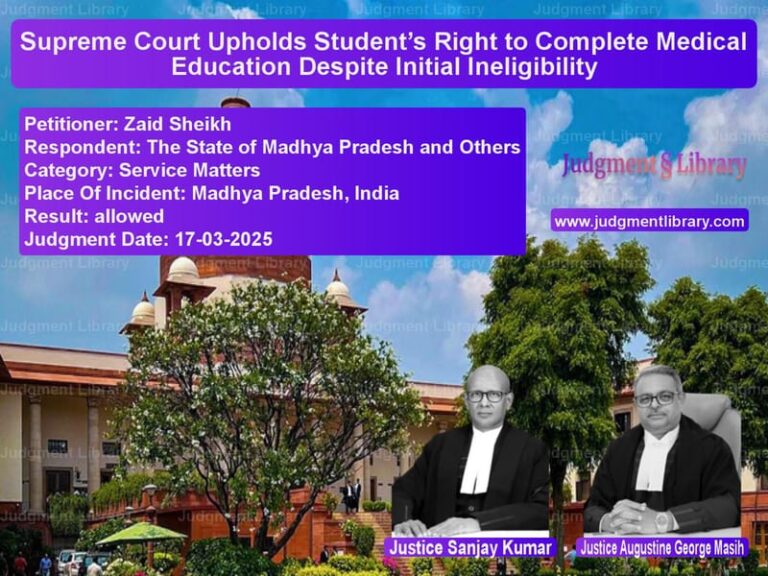Compassionate Appointments in Municipal Services: Supreme Court Judgment Analysis
This case involves the Ahmednagar Mahanagar Palika’s challenge to the direction of the High Court of Bombay regarding the appointment of the heirs of deceased employees on compassionate grounds. The appeals were filed after the High Court upheld the decision of the Industrial Court, which had mandated that the Mahanagar Palika appoint heirs of the deceased employees upon their retirement or superannuation, in accordance with a judgment and award passed in 1981. The issue at hand was the legality and fairness of providing such appointments to the heirs of employees, in light of changes in the administrative structure of the municipal corporation.
The case centers on the historical background of the employment policies within the Ahmednagar Municipal Council, which, in 2003, became the Ahmednagar Mahanagar Palika. The main point of contention was the applicability of the 1981 award passed by the Industrial Court, which had originally governed employment rules within the old Municipal Council. The question arose whether the Mahanagar Palika, now a municipal corporation, should be bound by the same award, or if the rules of appointment should be modified according to the current governance framework.
Background of the Dispute
The dispute began when the Mahanagar Palika was converted from the Ahmednagar Municipal Council in 2003. Prior to the conversion, an industrial dispute had been raised by the Union regarding the employment of the heirs of deceased employees in the Municipal Council. This resulted in the Industrial Court passing an award on 30.03.1981 (Reference IT No. 51 of 1979), which mandated that the heirs of employees in certain categories would be granted employment on their retirement, superannuation, or death.
However, after the conversion to a Municipal Corporation, the Mahanagar Palika was governed by new rules and regulations laid out by the State Government. These new rules did not provide for the same compassionate appointments for the heirs of employees upon their retirement, as was done in the past. Despite these changes, the Union filed complaints before the Industrial Court in 2005, demanding that the heirs of employees be given appointments as per the 1981 award.
The Industrial Court, in its judgment of 16.09.2016 and 21.09.2016, directed the Mahanagar Palika to provide employment to the heirs of employees on their retirement, based on the 1981 award. The Palika, dissatisfied with these orders, approached the High Court, which dismissed its writ petitions. Consequently, the Mahanagar Palika appealed to the Supreme Court, arguing that the orders were outdated and unfair in the context of the current regulatory framework.
Petitioner’s Arguments
The appellant, Ahmednagar Mahanagar Palika, represented by Mr. Suhas Kadam, argued that the directions given by the Industrial Court and upheld by the High Court were erroneous. The Palika contended that the 1981 award had been made when the Municipal Council existed, and that after the conversion into a Municipal Corporation, the employees should be governed by new state policies and schemes applicable to government employees. The Palika further argued that the 1981 award was outdated and did not reflect the current realities of governance.
Additionally, the appellant contended that the direction to provide compassionate appointments was inconsistent with Article 14 of the Constitution, as it favored a certain group (the heirs of employees) without any reasonable justification. The appellant also pointed to the recent decision of the Supreme Court in *Bheemesh alias Bheemappa* (2021), which emphasized that appointments on compassionate grounds should be in line with current government schemes and not based on outdated rules.
The Palika further argued that such appointments would be detrimental to merit-based recruitment and could create an unfair system where only the heirs of employees could be appointed, regardless of their qualifications, in contrast to the meritocratic processes used for other government positions.
Respondent’s Arguments
The respondents, represented by Ms. Iyer Shruti Gopal, argued that the directions passed by the Industrial Court and upheld by the High Court were in line with the binding nature of the 1981 award. The Union contended that the compassionate appointments were a right guaranteed to the heirs of deceased employees under the terms of the 1981 award, and that this right could not be taken away, even after the conversion of the Municipal Council into a Municipal Corporation.
The respondents emphasized that the compassionate appointments were based on a bipartite agreement and an industrial dispute settlement, which had been implemented and was binding on the Mahanagar Palika. They also argued that the heirs were entitled to the appointments, as the earlier judgments had provided clear and unambiguous directions for such appointments in the event of superannuation or retirement.
Furthermore, the respondents contended that the arguments about the violation of Article 14 were misplaced, as the appointments were in accordance with the settled terms of the earlier industrial dispute and were not arbitrary or discriminatory. They stressed that the orders of the Industrial Court and the High Court did not violate constitutional principles and should be enforced to honor the longstanding commitment made to the employees and their families.
Read also: https://judgmentlibrary.com/m-p-medical-officers-pay-scale-dispute-supreme-courts-landmark-judgment/
Court’s Reasoning
The Supreme Court, after hearing the parties and reviewing the facts, analyzed the legal standing of the 1981 award in the context of the modern governance structure of the Mahanagar Palika. The Court noted that the original award had been made under a different institutional framework, and that the conversion to a Municipal Corporation in 2003 necessitated a reassessment of the employment policies for the heirs of employees.
The Court also acknowledged the argument that the compassionate appointment system is meant to provide support to the families of employees who die while in service, and that it is not meant to be an automatic process for all employees or their families. The Court recognized that compassionate appointments must be based on current needs and the overall policy objectives of the government, including the allocation of resources and the merit-based recruitment processes.
In this regard, the Court referred to its previous rulings, including the case of *Bheemesh alias Bheemappa*, where it was held that compassionate appointments should be in line with the modified government schemes. The Court also took note of the fact that the original award was made in 1981, when the Municipal Council was a smaller entity, and that the new policies post-2003, under the Municipal Corporation framework, did not align with the earlier provisions.
Judgment
The Supreme Court ruled in favor of the appellant, Ahmednagar Mahanagar Palika, and quashed the High Court’s order, as well as the directions given by the Industrial Court. The Court held that the compassionate appointment of the heirs of employees upon their retirement or superannuation was not a reasonable demand, given the current policies of the State Government, which did not provide for such appointments in the case of retired employees.
The Court emphasized that compassionate appointments should be made in accordance with the current schemes, which are subject to merit-based scrutiny and cannot be extended automatically to the heirs of employees upon their retirement. The Court further noted that the earlier awards, while binding at the time, had become outdated and should not be used to justify current employment practices within the Mahanagar Palika.
Conclusion
The Supreme Court’s judgment in this case provides significant clarity on the issue of compassionate appointments, particularly in light of changes in administrative structures and governance frameworks. The ruling emphasizes the importance of aligning employment policies with current government schemes and ensuring that appointments are based on merit and need, rather than being granted automatically to the families of retired employees.
The case highlights the need for policies to adapt to changing circumstances and the importance of upholding the constitutional values of fairness and equality in the recruitment process. The judgment also underscores the Court’s role in ensuring that outdated agreements do not perpetuate unfair systems of employment that could hinder opportunities for others who are equally qualified.
Petitioner Name: Ahmednagar Mahanagar Palika.Respondent Name: Ahmednagar Mahanagar Palika Kamgar Union.Judgment By: Justice M.R. Shah, Justice B.V. Nagarathna.Place Of Incident: Ahmednagar, Maharashtra.Judgment Date: 05-09-2022.
Don’t miss out on the full details! Download the complete judgment in PDF format below and gain valuable insights instantly!
Download Judgment: ahmednagar-mahanagar-vs-ahmednagar-mahanagar-supreme-court-of-india-judgment-dated-05-09-2022.pdf
Directly Download Judgment: Directly download this Judgment
See all petitions in Employment Disputes
See all petitions in Public Sector Employees
See all petitions in Promotion Cases
See all petitions in Workplace Harassment
See all petitions in Termination Cases
See all petitions in Judgment by Mukeshkumar Rasikbhai Shah
See all petitions in Judgment by B.V. Nagarathna
See all petitions in allowed
See all petitions in supreme court of India judgments September 2022
See all petitions in 2022 judgments
See all posts in Service Matters Category
See all allowed petitions in Service Matters Category
See all Dismissed petitions in Service Matters Category
See all partially allowed petitions in Service Matters Category

